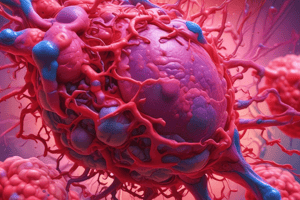Podcast
Questions and Answers
What enzyme is responsible for activating XIII, allowing it to cross-link fibrin into polymers that stabilize the Fibrin Clot?
What enzyme is responsible for activating XIII, allowing it to cross-link fibrin into polymers that stabilize the Fibrin Clot?
Which natural anticoagulant inhibits factors IIa, Xa, and other coagulation factors?
Which natural anticoagulant inhibits factors IIa, Xa, and other coagulation factors?
What autocrine-paracrine mediator secreted from endothelial cells or platelets promotes vasodilation and inhibits platelet activation?
What autocrine-paracrine mediator secreted from endothelial cells or platelets promotes vasodilation and inhibits platelet activation?
Which protein acts as a cofactor for activating Protein C and increases the formation of plasmin?
Which protein acts as a cofactor for activating Protein C and increases the formation of plasmin?
Signup and view all the answers
What anticoagulant inhibits the extrinsic Tenase complex in the clotting cascade?
What anticoagulant inhibits the extrinsic Tenase complex in the clotting cascade?
Signup and view all the answers
What is the main function of clotting factors circulating in an inactive form?
What is the main function of clotting factors circulating in an inactive form?
Signup and view all the answers
Why is the endothelial lining of blood vessels smooth and negatively charged?
Why is the endothelial lining of blood vessels smooth and negatively charged?
Signup and view all the answers
Which factor plays a role in preventing clot extension by converting plasminogen into plasmin to digest fibrin clots?
Which factor plays a role in preventing clot extension by converting plasminogen into plasmin to digest fibrin clots?
Signup and view all the answers
What is the function of glycoprotein coat on circulating platelets?
What is the function of glycoprotein coat on circulating platelets?
Signup and view all the answers
Why is the speed of blood flow optimal in preventing activation of clotting factors?
Why is the speed of blood flow optimal in preventing activation of clotting factors?
Signup and view all the answers
What is the main purpose of the Fibrinolytic Phase in haemostasis?
What is the main purpose of the Fibrinolytic Phase in haemostasis?
Signup and view all the answers
What regulates the IMMEDIATE CONSTRICTION PHASE in haemostasis?
What regulates the IMMEDIATE CONSTRICTION PHASE in haemostasis?
Signup and view all the answers
Which enzyme catalyzes the decarboxylation of Vit K-dependent Coagulation Factors?
Which enzyme catalyzes the decarboxylation of Vit K-dependent Coagulation Factors?
Signup and view all the answers
What is the final product of the Blood Coagulation Phase in haemostasis?
What is the final product of the Blood Coagulation Phase in haemostasis?
Signup and view all the answers
Which phase prevents the uncontrolled extension of thrombus or its embolization?
Which phase prevents the uncontrolled extension of thrombus or its embolization?
Signup and view all the answers
What role do anticoagulant agents play in preventing clot extension?
What role do anticoagulant agents play in preventing clot extension?
Signup and view all the answers
Which factor inhibitors are used to prevent the progression of thrombosis in acute insults?
Which factor inhibitors are used to prevent the progression of thrombosis in acute insults?
Signup and view all the answers
How does fibrinolysis contribute to dissolving blood clots?
How does fibrinolysis contribute to dissolving blood clots?
Signup and view all the answers
What is the primary function of tissue plasminogen activator (t-PA) in the context of fibrinolysis?
What is the primary function of tissue plasminogen activator (t-PA) in the context of fibrinolysis?
Signup and view all the answers
What is the main action of fibroblasts on a blood clot during the repair process?
What is the main action of fibroblasts on a blood clot during the repair process?
Signup and view all the answers
What is the purpose of the Immediate Constriction Phase during hemostasis?
What is the purpose of the Immediate Constriction Phase during hemostasis?
Signup and view all the answers
What is the primary function of Platelets in the Platelet Plug Phase of hemostasis?
What is the primary function of Platelets in the Platelet Plug Phase of hemostasis?
Signup and view all the answers
What is the final result of the Blood Coagulation Phase during hemostasis?
What is the final result of the Blood Coagulation Phase during hemostasis?
Signup and view all the answers
How does Factor XIII contribute to the hemostatic process?
How does Factor XIII contribute to the hemostatic process?
Signup and view all the answers
What role do factors preventing clot extension play in the hemostatic mechanism?
What role do factors preventing clot extension play in the hemostatic mechanism?
Signup and view all the answers
What is the first step in the Amplification Phase of Coagulation?
What is the first step in the Amplification Phase of Coagulation?
Signup and view all the answers
Which enzyme activates Factor IX to form the Tenase Complex in the Intrinsic Pathway?
Which enzyme activates Factor IX to form the Tenase Complex in the Intrinsic Pathway?
Signup and view all the answers
What stimulates platelet activation during the initiation phase of coagulation?
What stimulates platelet activation during the initiation phase of coagulation?
Signup and view all the answers
Which complex triggers the formation of the Thrombin Burst in the Amplification Phase?
Which complex triggers the formation of the Thrombin Burst in the Amplification Phase?
Signup and view all the answers
What is the first step in the Propagation Phase of Coagulation?
What is the first step in the Propagation Phase of Coagulation?
Signup and view all the answers
What is the main function of Factor V and Fibrinogen in the process of coagulation?
What is the main function of Factor V and Fibrinogen in the process of coagulation?
Signup and view all the answers
Which phase of coagulation involves the activation of TF present on extravascular surfaces?
Which phase of coagulation involves the activation of TF present on extravascular surfaces?
Signup and view all the answers
What is the significance of the little thrombin produced during the initiation phase of coagulation?
What is the significance of the little thrombin produced during the initiation phase of coagulation?
Signup and view all the answers
Which cells play a role in the activation of coagulation factors during the amplification and propagation phases?
Which cells play a role in the activation of coagulation factors during the amplification and propagation phases?
Signup and view all the answers
Why is coagulation now viewed as a 'CELL-BIOLOGICAL MODEL OF COAGULATION'?
Why is coagulation now viewed as a 'CELL-BIOLOGICAL MODEL OF COAGULATION'?
Signup and view all the answers
What event marks the initiation phase of coagulation?
What event marks the initiation phase of coagulation?
Signup and view all the answers
In which phase of coagulation do little activated extrinsic coagulation complexes form?
In which phase of coagulation do little activated extrinsic coagulation complexes form?
Signup and view all the answers
What initiates the Thrombin Spark that leads to the amplification and full activation of platelets?
What initiates the Thrombin Spark that leads to the amplification and full activation of platelets?
Signup and view all the answers
What differentiates the role of fibroblasts from activated platelets in the coagulation process?
What differentiates the role of fibroblasts from activated platelets in the coagulation process?
Signup and view all the answers
Why is it essential to understand the overlapping sequential phases of coagulation?
Why is it essential to understand the overlapping sequential phases of coagulation?
Signup and view all the answers
Study Notes
Coagulation Cascade
- Coagulation cascade is a series of chemical reactions that lead to the formation of a blood clot
- It involves the sequential activation of a set of molecules termed Coagulation Factors (I to XIII)
- Coagulation Factors belong to the plasma proteins and circulate as inactive proteolytic enzyme precursors
- They are initially synthesized mainly by the liver, except for Factor XIII which is synthesized by endothelial cells
Role of Calcium
- Calcium ions (the only non-protein coagulation factor) share in the activation of most phases except the first two steps in the intrinsic pathway during the amplification phase
Thrombin Burst and Fibrin Clot Formation
- Thrombin burst in the presence of Ca activates XIII, permitting it to cross-link the fibrin into polymers that stabilize the fibrin clot
- Platelets within the clot become retracted during this process
Prevention of Clot Extension
- Natural Anticoagulants:
- Antithrombin III, a non-Vit K dependent plasma protein, inhibits IIa, Xa, and other coagulation factors
- Heparin, a natural anticoagulant, enhances Antithrombin III activity
- Protein C, a natural anticoagulant, inhibits factors V & VIII activity
- Protein S, a cofactor, activates protein C and increases plasmin formation
- Autocrine-Paracrine Mediators:
- Prostacyclin, which promotes vasodilation and inhibits platelet activation
- Nitric oxide, which inhibits platelet adhesion and aggregation in response to thrombin
- Tissue-Factor Pathway Inhibitor (TFPI), an anticoagulant that inhibits extrinsic Tenase complex
Prevention of Unnecessary Clot Formation
- Clotting factors circulate in an inactive form and are permitted to become activated only upon injury
- The liver is capable of regularly removing activated factors
- The speed of flow of blood is optimum to prevent activation of clotting factors
- The healthy endothelial lining of blood vessels is smooth and negatively charged, preventing platelet adhesion
- Endothelial cells secrete mediators with potential anticoagulant action
- Circulating platelets have a glycoprotein coat that creates repulsion forces preventing sticking to healthy endothelium
- Plasma contains natural anticoagulants and a tightly regulated fibrinolytic system
Fibrinolytic Phase
- The fibrinolytic phase breaks down the fibrin clot once it becomes unnecessary, preventing uncontrolled extension of thrombus or its embolization
- It is also meant to regain patency of blood vessels during repair
Clinical Relevance
- Anticoagulant agents can be used to prevent thrombi formation or to halt the progression of thrombosis in acute insults
- Anticoagulant agents can block steps in coagulation by:
- Indirect inhibitors of thrombin formation by activating anti-thrombin III
- Direct thrombin inhibitors by binding directly to thrombin
- Factor X inhibitors
- Vit K inhibitors to block the coagulative profile of Vit K dependent factors
Studying That Suits You
Use AI to generate personalized quizzes and flashcards to suit your learning preferences.
Related Documents
Description
Test your knowledge on the coagulation cascade and clot formation process, including the role of thrombin, factor XIII, fibrin clot stabilization, and clot extension prevention. Figure 2: Coagulation cascade is included in the quiz content.




